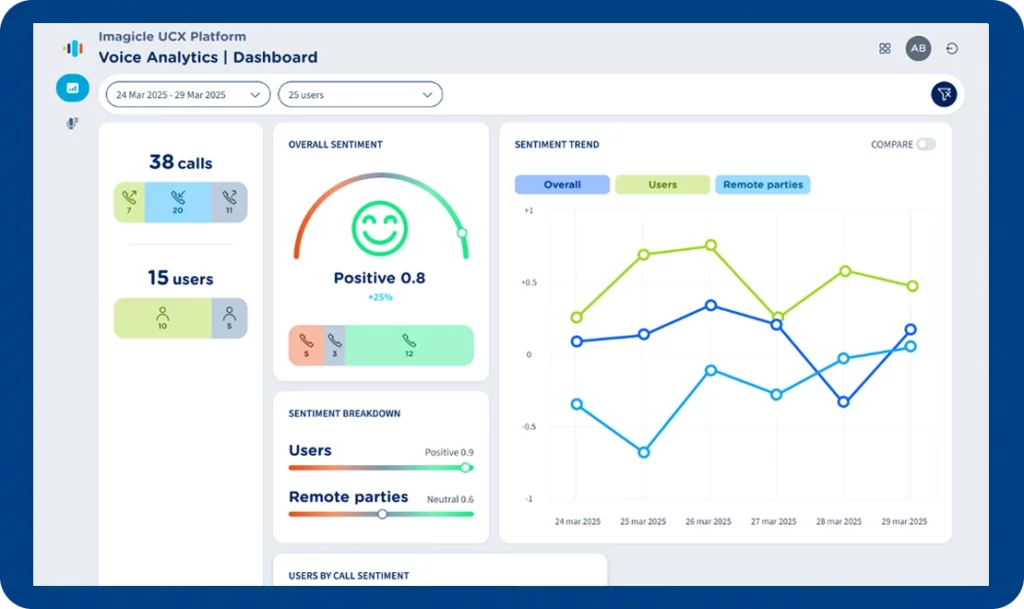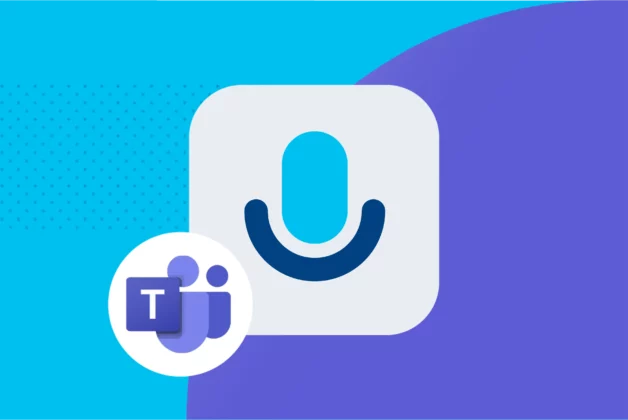 Fiamma Romano - 25 July, 2025 - 7 ’ read
Fiamma Romano - 25 July, 2025 - 7 ’ readTeams Voice Call Recording: 4 Things to Do Before Rolling Out The Solution
Microsoft Teams offers robust tools for communication and collaboration, including the ability to record meetings. But when it comes to Teams voice call recording for compliance, native capabilities only go so far.
Table of Contents
If your organization operates in a regulated industry like healthcare, finance, or legal services, relying solely on Teams’ built-in recording options won’t be enough. That’s because Microsoft Teams does not provide policy-driven, always-on recording for external or internal calls. It also lacks centralized governance, advanced retention controls, audit capabilities, and other features that compliance frameworks demand.
To fully meet compliance requirements, especially under regulations such as HIPAA, MiFID II, GDPR, or PCI DSS, organizations must implement certified third-party Teams voice call recording solutions that integrate with Teams using Microsoft’s compliance recording APIs¹.
This article focuses on how to prepare your business for rolling out a Teams voice call recording solution that meets both compliance standards and employee expectations. Not just technically, but operationally and culturally.
1. Defining Your Teams Voice Call Recording Policy and Scope
Before selecting a vendor or configuring any settings in Teams, your organization needs to define what “compliance recording” actually means in your specific context. This starts with understanding the gaps in the native Teams experience, and how third-party solutions close them.
What the native Teams recording covers:
- Recording of scheduled meetings, started manually by a participant
- Cloud storage in OneDrive or SharePoint
- Optional transcriptions, searchable after the session
- User-based control: individuals can start/stop the recording
- No automated call capture: recordings depend on user action
These features are excellent for productivity and internal documentation, but they’re not designed to meet Teams recording compliance obligations. In fact, they can introduce risk:
- Recordings might not happen when they should (user forgets or refuses)
- There’s no audit trail for administrators
- Lack of enforced policies or retention schedules
- Inability to record non-meeting voice calls (like 1:1 PSTN or internal Teams calls)
- No controls for consent collection, encryption, or access management
On the other hand, a compliance-grade solution must provide:
- Automatic recording, without user intervention
- Policy-based control over who is recorded and when
- Coverage for all call types: PSTN, internal Teams calls, meetings
- Secure, compliant storage and retention policies
- Full auditability, including logs and access tracking
- User notifications and consent management to meet GDPR, HIPAA and other legal requirements
By working with a Microsoft-certified compliance recording partner, you can enforce consistent recording behaviors across your organization, eliminate manual risks, and align with international compliance frameworks.
Bottom line, native Teams recording doesn’t equal Teams recording compliance. It’s built for collaboration. If compliance is your goal, third-party integration is not optional. It’s essential.
Learn how to navigate Microsoft Teams compliance with ease
Teams Call Recording in 2025: a Guide by Imagicle tells you everything you need to know to master compliance on your platform without headaches.
2. Engaging Key Stakeholders Early
Rolling out a compliance-grade voice recording solution in Microsoft Teams is a cross-functional project that touches data privacy, employee trust, legal liability, and operational transparency. Engaging the right stakeholders early can make the difference between a smooth rollout and a costly internal setback.
Who needs to be involved?
| Stakeholder | Role in the rollout |
|---|---|
| IT & Unified Comms | Vendor integration, infrastructure setup, call routing policies |
| Legal & Compliance | Interpreting regulatory requirements, defining what must be recorded |
| Data Protection Officer (DPO) | Ensuring GDPR/HIPAA alignment, privacy notices, consent policies |
| HR | Managing internal policies, addressing employee questions |
| Corporate Communications | Crafting clear messaging for internal rollout |
| Security & Governance | Reviewing storage, encryption, and access management policies |
Depending on your organization, you may also want to involve:
- Risk management teams
- Line-of-business leaders (e.g. sales, customer service)
- Works councils or unions (especially in countries like Germany or France)
Why cross-functional ownership matters
When a third-party Teams call recording compliance solution is introduced, it brings changes that must be explained, governed, and accepted at all levels. If employees aren’t informed or feel blindsided, adoption suffers and legal risk increases.
On the other hand, involving them early ensures regulatory interpretations are consistent and defensible, policies reflect operational realities, communication is transparent and coordinated and questions and concerns are addressed proactively.
It also helps clarify decision-making responsibility. For example:
- Who determines which users are recorded?
- Who owns policy exceptions?
- Who audits the use of recordings?
- Who handles user complaints or data subject access requests?
Without defined roles, these questions lead to friction, delays, or worse – regulatory violations.
Set the narrative early
Don’t let the narrative build on its own. Or worse, through rumors. People will naturally ask:
- Why are we being recorded now?
- Is this about control or surveillance?
- Who can access these recordings?
- Will this affect my performance reviews?
Address these head-on in your internal rollout:
- Emphasize that recording is for Teams call recording compliance, customer protection, and quality assurance — not surveillance
- Clarify that it’s not personal or performance-related
- Explain the benefits for users themselves: dispute resolution, coaching, clarity in high-stakes calls
3. Managing Consent and Privacy Requirements
Recording conversations, even for legitimate compliance purposes, involves the processing of personal data. As stated previously, depending on your jurisdiction and industry, Teams Voice Call Recording may be subject to strict privacy requirements, such as GDPR in the EU, HIPAA in the U.S., or other national laws and sectoral codes.
That’s why consent, transparency, and governance must be embedded into your Teams voice call recording rollout from day one.
Understand your legal basis
Under GDPR (Article 6), you need a lawful basis for recording. The most common options for voice call recording are:
- Legal obligation: e.g. MiFID II for financial services
- Legitimate interest: e.g. quality monitoring, dispute resolution
- Explicit consent: used when no other legal basis applies, or in highly privacy-sensitive environments
In HIPAA-regulated environments (like healthcare providers in the U.S.), consent is not always explicitly required for operational use, but data security and access controls are mandatory, and patients must be informed where PHI (Protected Health Information) is involved.
Notify users and participants
Even when consent isn’t required, transparency is.
Participants (both internal and external) must be made aware that the call is being recorded. Microsoft Teams supports this through visual notifications in the call/meeting UI.
Your third-party compliance recording solution should enable consistent and customizable disclaimers for inbound and outbound PSTN calls, internal Teams calls, scheduled and ad-hoc meetings.
You may also need to update your privacy policy, provide written notices for internal staff, document how users can exercise their rights (e.g. access or delete data).
Limit access and define retention rules
Compliance doesn’t stop once the call is recorded. You must also:
- Define who can access recordings, and under what conditions
- Implement role-based access controls (RBAC) in your recording platform
- Keep logs and audit trails of every access or export
- Set retention periods that align with legal and operational requirements
- Encrypt recordings both in transit and at rest
Most certified third-party recording solutions (including Imagicle) provide these controls by default, along with compliance certifications like ISO 27001.
Handle cross-border and multi-region complexities
If you operate globally, keep in mind:
- Some countries (e.g. Germany, France) require double consent for recording
- In others, recording employees without consent may be illegal, even if clients are informed
- Cross-border data transfers must comply with data localization or data transfer agreements
If needed, configure geo-specific policies in your recording solution to apply different rules in different regions.
Plan for Data Subject Access Requests (DSARs)
Under GDPR and similar regulations, individuals have the right to:
- Know whether you’ve recorded their call
- Access a copy of the recording
- Request correction or deletion (in some cases)
Your internal process must be ready to handle these requests efficiently. That includes identifying recordings by metadata (user ID, timestamp, number), verifying requester identity, logging every step taken to fulfill the request.
Related Content
- Teams Call Queue Reporting: what is the Queues App?
- Contact Center for Microsoft Teams: do you need to build one?
- Microsoft Teams Call Reporting: Why it Matters
4. Why Choose Imagicle for Teams Call Recording
When it comes to compliance recording in Microsoft Teams, not all solutions are created equal. You need a partner that doesn’t just meet technical specifications, but also supports your organization across every step of the compliance journey, from rollout to audit.

Imagicle offers a certified, enterprise-grade call recording solution designed specifically to meet the demands of regulated industries using Microsoft Teams. Here’s why leading organizations across finance, healthcare, and public sector choose Imagicle:
Compliant by Design
Compliance isn’t an afterthought. It’s in Imagicle’s DNA. Designed to meet the needs of highly regulated industries, Imagicle’s voice recording solution offers safeguards that align with international standards such as GDPR, HIPAA, MiFID II, PCI-DSS, Dodd-Frank, FINMA, and more.
Certified to Work with Microsoft Teams
Imagicle offers a policy-based recording solution that is officially certified for Microsoft Teams², ensuring full alignment with Microsoft’s rigorous standards for reliability, security, and compliance. This certification guarantees that Imagicle integrates seamlessly with the Teams ecosystem, enabling organizations to automatically capture and manage voice communications based on customizable policies.
Seamless Microsoft Teams Integration – Improved User Experience
Imagicle’s integration with Microsoft Teams involves access from the Microsoft Teams client to listen to, download, browse recordings (with role-based access and password protected). With a native Teams app integration, users and supervisors can access call recordings, trigger recording, or pause/resume sessions from within the Teams interface itself.
Supervisors and compliance officers often manage thousands of recordings finding the right one quickly is essential. Imagicle provides advanced filtering options, allowing users to search recordings by user or group, call direction (inbound/outbound), date, time, duration, call type or department, tags or notes.
The result is a frictionless experience for:
- End users, who can record and retrieve their calls without navigating to external systems
- Supervisors, who can review and filter calls using an intuitive search&play interface
- IT administrators, who benefit from centralized control, detailed logging, and compliance configuration – and, above all, a
Microsoft Teams compliance recording solution up and running with no headaches
For a deeper dive into Imagicle Call Recording user experience, our experts are free for a a free 30-minute demo whenever it’s convenient for you.
AI-infused by design
Cherry on top, Imagicle Teams Voice Call Recording is complete with Voice Analytics, a native AI add-on that completes the solution with multilingual transcriptions and sentiment analysis, giving supervisors an at-a-glance, yet complete view of performances at agent, company, group level. They can assess sentiment at phrase, whole call, or calling party level, set up alarms for specific keywords, search conversations by hot topic, and more.

Final Thoughts: Recording with Confidence, at Scale
Rolling out Teams voice call recording is not just about ticking a regulatory box, it’s about building trust, reducing risk, and ensuring accountability across your communications.
By preparing the organization from both a technical and cultural standpoint, and partnering with a trusted compliance vendor like Imagicle, you can ensure that every conversation is protected, discoverable, and managed in line with global standards.
Ready to make Teams voice call recording work for your compliance strategy?
Schedule a demo with Imagicle or talk to one of our experts today.
¹https://learn.microsoft.com/en-us/microsoftteams/teams-recording-compliance
²https://cloudpartners.transform.microsoft.com/compliance-recording-solutions
You might also be interested in…
-
Products Blog
Teams Call Recording in 2025: Ensuring Compliance and Exceeding Customer Expectations
Teams Call Recording in 2025: Ensuring Compliance and Exceeding Customer ExpectationsExplore how teams call recording transforms compliance, training, and CX in 2025. Discover real-world use‑cases, regulatory insights, and how Imagicle’s certified solution secures every interaction for regulated industries. -
Download
Brochure BlogTeams Call Recording in 2025 – a Guide by Imagicle
Teams Call Recording in 2025 – a Guide by ImagicleNeed secure Teams call recording? Read Imagicle’s 2025 guide and learn how 3rd party solutions guarantee compliance. -
Products Blog
Contact Center for Microsoft Teams: Do You Need to Build One?
Contact Center for Microsoft Teams: Do You Need to Build One?Is building a contact center for Microsoft Teams what's keeping your business from ultimate success? Find out.
 Welcome
Welcome Automate
Automate Ensure
Ensure Analyze
Analyze Other
Other

